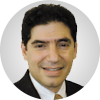It is easy to sail a straight course when heading downwind with a steady breeze; doing so hardly tests one's seamanship. The same can be said to be true for life and particularly for the purpose of this discussion, our profession of chiropractic.
The problem with hypothetical questions is that you may believe you know how you will respond in these hypothetical circumstances, but the strength of your moral fiber is unknown until confronted with a wind that tries to blow you off course. Some people are lucky enough to never have the strength of their moral fiber tested and enjoy a life during which they sail easily along their charted course. Others are tested brutally by ever-shifting winds.
During World War II, German boxer Max Schmeling might have been thought of as the poster child for the Nazi ideal of the Arian ubermensch (superman). He had fame, fortune and was well-regarded by everyone including Hitler. However, Schmeling risked it all by sheltering his Jewish friend's two sons in his hotel residence in Berlin during Krystallnacht in November 1938. He told the maids that he was sick and didn't want to make others ill, so they shouldn't come in. The children stayed with him for a short time; then he helped get them safely out of Germany. Clearly, Schmeling piloted a course that was true even in hazardous winds.1-4
After the war, Schmeling didn't reveal this story, which would have rehabilitated his image outside of Germany, which of course had taken a distinct turn for the worse after the war. It was the children whose lives he helped save who eventually told the story in 1989. Asked why he risked his life, he reportedly said it was the duty of a man.4 Confronted with gale-force winds blowing anywhere but to the safety for these children, Schmeling showed that his moral fiber was made of stronger stuff than many other people during the Holocaust; and afterward, he was willing to accept his share of the blame for letting it occur at all.2
Moral fiber is very similar to muscle fiber. They both get stronger when they're adequately exercised. As NFL Hall-of-Fame coach
Vince Lombardi famously said, "Practice doesn't make perfect, perfect practice makes perfect." For the chiropractor in practice, there have always been many shifts in the wind that have threatened to blow us off course. The specific challenges to our moral fiber have changed in every generation. There were those whose moral fiber had them practicing, as Dr. Richard Vincent of Massachusetts says, in "moral defiance" prior to licensure.
Among the challenges facing our profession today are the gale-force winds that create unfair challenges to getting paid a fair amount for the important treatments we provide to patients. During these times, we have the opportunity to test our moral compasses and see if we have the moral fiber to steer a course that is true even when it is difficult to do so.
References
- See www.auschwitz.dk/schmeling.htm.
- Deford F. "The Choices of Max Schmeling." National Public Radio (online audio file), Feb. 9, 2005.
- Tenembaum B. "Max Schmeling: Aryan Champ, Savior of Jews." The International Raoul Wallenberg Foundation (www.raoulwallenberg.net).
- Hedderich N. "Max Schmeling: Righteous Ring Warrior?" History Today, January 1993;43. Accessed on www.pages.drexel.edu.
Click here for previous articles by Stephen M. Perle, DC, MS.





